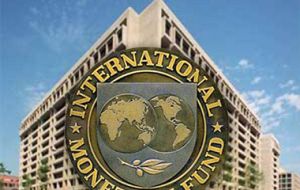MercoPress. South Atlantic News Agency
Financial regulation should be coordinated internationally, says IMF

The world avoided a great economic depression and will recover thanks to close cooperation from the international community, said IMF chief Dominique Strauss-Kahn.
Referring to a critical lesson from the recent crisis, he said success came from the approach championed by world leaders of the G-20 group of advanced and emerging economies and the IMF at the height of the crisis.
“National oriented responses are not the way, since they risk creating economic conflicts,” said Strauss-Kahn, adding that financial regulation in particular should be coordinated internationally.
Strauss-Kahn made the remarks during the kick-off to his week long trip to Brazil and Peru, where he will meet with business leaders, officials and students to discuss the challenges facing the global economy and how the IMF can harness global cooperation in the recovery.
In remarks and in a question and answer period session in front of an audience of 200 people, including academics, the private sector and the press, Strauss-Kahn tackled the question of new sources of growth in the global economy.
“We have seen China adopt a massive stimulus package geared towards reactivating internal demand, and moving away from its export model, and US consumers have started saving more, which also shows some change,” said Strauss-Kahn.
“One must not forget however that the U.S. consumer is currently the engine of worldwide growth so you can’t find a solution to the problem overnight. It is a lengthy process that will only take place gradually.”
Addressing the need to support the recovery and create sustainable growth in the long run, Strauss-Kahn said there is a “need for fiscal consolidation globally, but there is no future in fiscal consolidation without growth.”
Strauss-Kahn said the strength of the IMF lies in “truth telling,” and the IMF role in the surveillance of the global economy includes overseeing the implementation of rules that govern financial regulation. He said one of the tools at the IMF disposal is the Financial Sector Assessment Program, which examines and identifies the strengths and vulnerabilities of a country's financial system.
As a regional economic powerhouse, the Brazilian audience was interested in Strauss-Kahn’s views about the role of emerging economies in the global economy and the governance of the IMF.
“Emerging economies participate actively in the decision making at the Fund and their voice is much more powerful than in the past,” the IMF chief said. “I think we can no longer say that the IMF is an institution at the hands of the United States or Europe. However, this greater influence and greater power must be translated formally in the Fund workings.”
Strauss-Kahn also addressed the vestiges of the IMF past in Latin America, and said there is no one-size-fits-all solution for countries’ economic problems. He said the global lender is called into action when a country needs help, the way a doctor treats a patient with an illness.




Top Comments
Disclaimer & comment rulesCommenting for this story is now closed.
If you have a Facebook account, become a fan and comment on our Facebook Page!